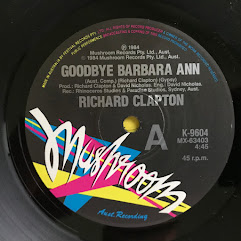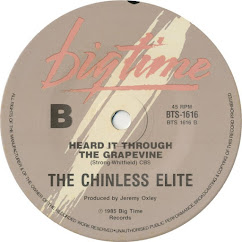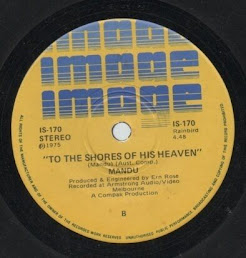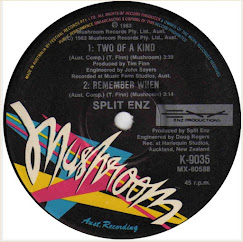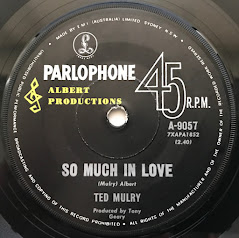(Australian/New Zealand 1970-1990)
All Fired Up is a collection of Australian rock rarities compiled by Paul Conn and released by ScreenSound Australia, the National Screen and Sound Archive, which features "hits, near misses and obscurities" of Australian music. The lineup includes famous Australian acts such as Mondo Rock, Icehouse, Redgum, Richard Clapton, John Paul Young, Ted Mulry and Goanna, and is especially welcome for the inclusion of some long-lost rarities by cult acts like Friends and Mandu.
All Fired Up presents an eclectic sampling of OzRock from the 70s to the 90s, and many tracks, most lifted from the B-sides of rare singles, have never before been released on CD. These include the original Australian version of the Pat Benatar hit All Fired Up (performed by Rattling Sabres), the Franklin Dam protest song Let the Franklin Flow performed by members of bands Goanna and Redgum, and the novelty song How About a Beer for the Horse performed by John Paul Young and the All Stars under the jokey guise of 'Sandshoe Willie and The Worn Out Soul Band'. The tracks were selected by Canberra music historian and radio presenter Paul Conn.
Radio, when it bothers to look back at all, presents predictable and narrow playlists that favour a handful of "usual suspects" from Australia and which are dominated by "golden oldies" from overseas. Only a fraction of the thousands of mainstream and independent music released in these years has been re-released or repackaged. Most now languish unheard in archives and private collections, and any effort to revive interest in this period of Australian music and uncover some of its lesser known artefacts is to be roundly applauded.
Such releases are gaining even greater importance because vinyl copies of these recordings are in some cases now the ONLY copies of this music to have survived. Sadly, even for recordings made as recently as the mid-1980s, we are discovering the lamentable fact that master tapes and multitracks -- even of recordings by prominent bands such as Dugites and Numbers -- have been lost or destroyed. Many singles released in these years were one-off independent efforts which were pressed in small quantities (and which mostly sold in even smaller quantities) and the archiving and re-release of such material is of vital importance.
All Fired Up - Battling Sabres(Written by K. Tolhunt, M. Grombacher & N. Giraldo, Released in 1987)
Better known as a hit for Pat Benatar, this original version was a one-off release by short- lived Melbourne band Rattling Sabres and failed to chart. Written and produced by Kerryn Tolhurst, previously in bands such as Country Radio, Mississippi, the Dingoes, and the Richard Clapton Band since 1970, All Fired Up was the A-side of Battling Sabres' only single. Released in a picture sleeve, it was quite an investment for the independent Mighty Boy Records. Robert Price
(ex Jo Jo Zep and the Falcons) was lead vocalist, Kerryn Tolhurst played lead guitar and the future
music director for John Farnham. Chong Lym, was on keyboards.
Power - Sharon O'Neill(Written by S. O'Neill, Released in 1984)
Sharon O'Neill was a successful export from New Zealand to Australia, where her strong song writing skills and vocals lifted her above other artists of the 1970s. Emerging from bands such as Chapta and Wellington Shiner in her native country, she gained recognition as the support act for Boz Scaggs 1980 Australian Tour. For three years she had consistent success with "How Do You Talk To Boys", "Waiting for You", "Losing You" and "Maxine" ln 1984, her career stalled when she resigned from her recording company. Short low-key tours of New Zealand in 2001 and 2002 with "When The Cat's Away" (including Margaret Urlich) was a surprise return. "Power" was her final single for CBS and lasted three weeks in the lower reaches of the charts in August 1984. The single was co-produced by her then husband Brent Thomas and guitarist Tommy Emmanuel.
B B Boogie - Friends(Written by Friends, Released 1972)
By December 1971, heavy music or progressive rock was finding its Australian audience when a new Melbourne outfit formed its first line-up under the name, Friends. Centered on New Zealanders vocalists Leo De Castro and Charlie Tumahai. the band was fluid through its 18 month existence.
In August 1972, the only single Friends put together came out on the ATA label. B B Boogie was the A-side, credited to the band collectively, which attracted no radio interest. No further studio recordings were made, but a live performance was included on the Sunbury 1973 triple album and the Garrison - Final Blow Unit 1 LP. It proved to be a stepping stone to greater things for some: Mark Kenndy and Duncan McGuire formed Ayers Rock, Charlie Tumahal joined Mississippi before joining UK's Be Bop Deluxe, while Leo De Castro spent the next 20 years in around 15 different, largely unknown bands. "BB Boogie" is a lesser known example of the style dominating 1970's Australian rock.
Goodbye Barbara Ann - Richard Clapton(Written by Richard Clapton, Released in 1984)
Recorded during the April-May 1984 sessions for the LP Solidarity, "Goodbye Barbara Ann" was released as a single on the strength of first reactions to the song. This marked a new beginning for Richard Clapton who had left WEA. following the success of The Great Escape LP and a short stint with the Party Boys in 1983.
A tribute to a north coast lifestyle, with an oblique reference to Brian Wilson of the Beach Boys, the song failed to chart. Richard Clapton made one appearance on the popular ABC-TV show Countdown to promote the song but there was no serious promotional activity beyond this. By the time the Solidarity LP was released in September 1984, the song was discarded and was not included on the album or on either of the subsequent CD compilation sets.
I Heard It Through The Grapevine - The Chinless Elite(Written by Strong/Whitfield, Released in 1985)
The Chinless Elite was a short lived band formed by Jeremy Oxley following the dissolution of his power pop band, the Sunnyboys. This unusual version of the Marvin Gayne song "I Heard It Through The Grapevine" was the B-Side of their only single released in November, 1985. Reminiscent of the Sunnyboys style (which had been influenced by the producer of their first tow LP's, veteran Lobby Loyde. The Chinless Elite demonstrated a creative approach to what was seen as a rhythm and blues classic song. They also released a 12" Mini Album in 1985 entitled Est Jest A Tastor. The band splintered within months and Jeremy Oxley disappeared from prominence in Australian rock music.
How About A Beer For The Horse - Sandshoe Willie And The Worn Out Soul Band(Written by Sandshoe Will/Honest Stan, Released in 1979)
In 1979, John Paul Young and The All Stars were at the end of a series of successful singles (Yesterday's Hero, I Hate The Music, I Wanna Do It With You, Love Is In The Air and Standing In The Rain) and released this novelty single under a pseudonym. It was not a hit and was never preserved on LP, and the band at that time included Harry Vanda, George Young, Ray Arnott and Warren Morgan., who obviously enjoyed a joke. Although John Paul Young continued recording into the 1980's nothing matched his early successes until the revival of Love Is In The Air for the 1992 movie Strictly Ballroom, and it once again climbed the charts. How About A Beer For The Horse (and it's B-Side Truck Driver) is well worth remembering as a novelty song.
Rebecca - Mario Millo
(Written by M.Millo, Released in 1979)
Rebecca was an instrumental by guitarist Mario Millo, released as the single from
The Australian Guitar Album, a compilation set of specially commissioned workouts by Kevin Borich, Ian Moss, Lobby Loyde, Phil manning and others in 1979. Mario Millo came from Sydney's western suburbs where he learned to play the mandolin as a child, releasing his first single as a 14 year old member of the Clik in 1969. During 1979 he had a busy year - writing and recording the soundtrack for Against The Wind TV series (including Jon English's "Six Ribbons" single), and recording his solo LP Epic III. After releasing a further LP Human Games in 1983, Mario Millo changed to focus on soundtrack work, including movies such as Shame (1987) and the Lighthorsemen (1987) and TV series such as Brides of Christ, Changi and Heroes Mountain - The Thredbo Story.
Let The Franklin Flow - Gordon Franklin and The Wilderness Ensemble(Written by F.River (alias Shane Howard), Released in 1983)
Recorded live at the People For Nuclear Disarmament Concert at the Sidney Myer Music Bowl, Melbourne on 13 February 1983, this loosely assembled group was built around Goanna (led by Shane Howard) and members of other bands including Redgum. Production by Trevor Lucas (a Melbourne folk musician) turned this impromptu protest song against the damming of Tasmania's Franklin River into a hit. It reached number 15 on the charts in May that year. The B-side of the single Franklin River - World Heritage featured spoken discussion of issues by future Greens Senator, Bob Brown. The single was a fundraiser for the Tasmanian Wilderness Society.
Il Mondo Caffe - Mondo Rock(Written by R Wilson/J Black, Released in 1982)
"Il Mondo Caffe" was the B-side of the first single lifted from Mondo Rock's successful Nuovo Mondo LP. Released in July 1982 to coincide with that LP, the A-Side "No Time" went to number 11 on the charts. It reinforced the slicker style that Ross Wilson bought to the band, contrasting with the derivative Daddy Cool. By this time, guitarist Eric McCusker was dominating songwriting in the band, but this B-side is an interesting instrumental workout co-written by Ross Wilson and keyboard player, James Black.
Roll It On Robbie - Redgum(Written by H McDonald/M Spicer. Released in 1987)
Redgum, primarily known for it's highly politicised folk rock songs, recorded in 1987 this humorous single about condoms. The original members met in the mid 1970's at Adelaide Flinders University, but by 1987 the band's front man John Schuman had long since left. "
Roll It On Robbie" was Redgum's final single release, co-written by band members Hugh McDonald and Michael Spicer. Nothing on the band's final LP Midnight Sun, would have prepared listeners for something like this song. Although it did enter the Top 40 Charts, due to it controversial content and presented in a picture sleeve complete with information about condom's usage, this rare single was regarded more as a novelty song than a serious piece of social advice. It was an unusual and unintentionally funny finale to the band's career, contrasting with the more serious content of their seven albums.
To The Shores Of His Heaven - Mandu(Written by Mandu, Released in 1975)
This B-Side single was also the title of the only LP release by Melbourne singer Mandu whose real name was Chris Moraitis. Featuring the best of the Melbourne music scene of 1975 (Phil Manning, Gary Young, Barry Sullivan and others), this single was a sample from a very loosely arranged concept album about a visitor from space reflecting on the state of the earth. "To The Shores Of His Heaven" was recorded at Armstrong Studios in Melbourne by veteran producer Ern Rose. The A-Side was a version of the Rolling Stones "Gimme Shelter". Although he never released any further solo work, Mandu went on to work with Lobby Loyde as vocalist on two LPs - Obsecration and Live With Dubs, he then stopped recording.
Arcade - Doug Parkinson(Written by M. Perjanik, Released in 1979)
During a career that had started in 1965 with his high school band Strings And Things, and later bands like Doug Parkinson In Focus and Fanny Adams, Doug Parkinson became famous for his rough vocals, strong stage presence and versatility. In late 1979, he took some time off from working with the Southern Star Band, to record this one-off single for the TV soap opera Arcade.
This was his only release on the ATA label. Written by Mike Perjanik and engineered by Duncan McGuire (a veteran of many bands, most notably Ayers Rock), this lightweight song still proved to be a vehicle to show off Doug Parkinson's fine voice.
Two Of A Kind - Split Enz(Written by Tim Finn, Released in 1983)
"Two Of A Kind" was one of two songs on the B-Side of a single released by Split Enz on the 28th March, 1983. The single made no impact on Top 40 charts. Like the A-Side "Next Exit" and other B-side song "Remember When", "Two Of A Kind" was never released on a Split Enz album during the life of the band. Tim Finn wrote all three songs, the while the other two eventually made it to CD on the Rear Enz set, this one escaped. Each of the three songs was recorded in different studios - "Two Of Kind" was recorded at the Music Farm, Mullumbimby NSW. Two months after this single was released, Tim Finn released his first solo single "Fraction Too Much Friction", which charted well and was the start of the demise of Split Enz.
So Much In Love - Ted Mulry(Written by Martin 'Ted' Mulry, Released in 1970)
In 1970, the liner notes on Ted Mulry's first solo LP said it all - "Nobody was emerging unless they were Americans who didn't need the Australian market anyway. Well, they sorted all that out and Julia did her thing...Meanwhile, Ted Mulry was driving his bulldozer and getting more gigs. His reputation as a rocking ballad singer was travelling by word of mouth as well as by radio"
British born Ted Mulry arrived in Australia in 1966, and four years later put out his first, self-written solo single. "Julia" peaked at number 5 on the Sydney charts in early 1970. The B-Side was another song in the same vein also penned by Ted Mulry, "So Much In Love". He was very shy about his prospects and was fortunate that Tony Geary from EMI Records took the chance to produce both songs on his first single on the Parlophone label. Mulry's solo career faltered after a year of moderate success, compounded by a disastrous foray back to the UK. Back in Australia, The Ted Mulry Gang revived his fortunes from 1974 onwards, and he made ten more albums until his untimely death from cancer. "So Much In Love" is a reminder of where it started for him.
Sorry - Flowers(Written by H.Vanda/G.Young)
Recorded live in Studio 301, Sydney in August, 1980, this version of the Easybeats' hit song was released as a bonus single in 1990 as part of a double single tenth anniversary pack for Icehouse.
It was attributed to Flowers, the original name of their first album Icehouse, the reinvigorated band adopted this name to move into a decade of highly produced singles and albums. The first ten years of the band ended with 1990's Code Blue LP which saw them retreat into a studio-based vehicle for Iva Davies. The A-Side Sorry (backed with a version of the T-Rex song Think Zinc) is an energetic reminder of early punk rock.
This post consists of MP3's (320kps) ripped from CD (sourced from Midoztouch many moons ago) and includes full album artwork. I really like this Aussie/NZ compilation because it showcases such a diverse sample of musical styles and obscurities. And I had no idea who Sandshoe Willie And The Worn Out Soul Band was until I came across this release - would never had picked it to be an Albert Production ruse.
01 Rattling Sabres – All Fired Up
02 Sharon O'Neill – Power
03 Friends – B B Boogie
04 Richard Clapton – Goodbye Barbara Ann
05 The Chinless Elite – I Heard It Through The Grapevine
06 Sandshoe Willie & The Worn Out Soul Band – How About A Beer For The Horse
07 Mario Millo – Rebecca
08 Gordon Franklin And The Wilderness Ensemble – Let The Franklin Flow
09 Mondo Rock – Il Mondo Cafe
10 Redgum – Roll It On Robbie
11 Mandu – To The Shores Of His Heaven
12 Doug Parkinson – Arcade
13 Split Enz – Two Of A Kind
14 Ted Mulry – So Much In Love
15 Flowers – Sorry
 The Garrison discotheque was a small two-storey building sandwiched between a chemist shop and a billiard parlour in High Street, Prahran (Melbourne). Thursday to Sunday nights it rocked through the early hours of the morning to the sounds of the best rock bands in Australia. Against strong opposition, the local council forced its closure in June 1973.
The Garrison discotheque was a small two-storey building sandwiched between a chemist shop and a billiard parlour in High Street, Prahran (Melbourne). Thursday to Sunday nights it rocked through the early hours of the morning to the sounds of the best rock bands in Australia. Against strong opposition, the local council forced its closure in June 1973. 























